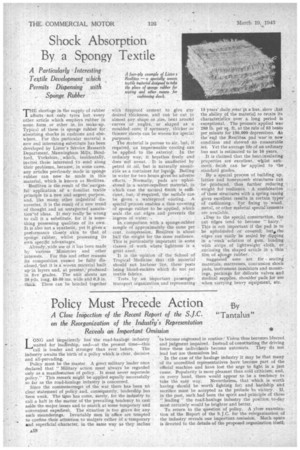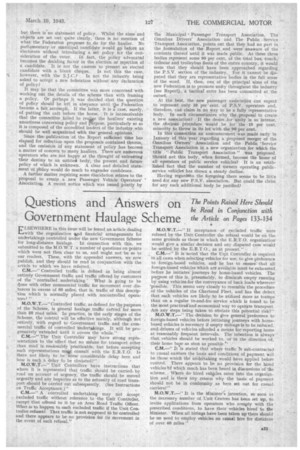Policy Must Precede Action By A Close Inipection of the Recent Report of the S.J.C. "Tantalus"
Page 20

Page 23

If you've noticed an error in this article please click here to report it so we can fix it.
on the Reorganization of the . Indust;y's Representation
Reveals an Important Omission • LONG and impatiently has the road-haulage industry waited for leaSership, and—at the present time—this
call is louder and stronger than ever before. The industry awaits the birth of a policy which is clear, decisive and all-pervading.
Policy must be the master. A great military leader once declared that " Military action must always be regarded only as a manifestation of policy. It must never supersede policy." This remark might be applied equally successfully so far as the road-haulage industry is concerned.
Since the commencemcpt of the war there has been nb clear statement of policy and, consequently, leadership has been weak. The time has come, surely, for the indpstry to call a halt in the matter of -the prevailing tendency to cast aside-the major-issues and to snatch at some temporary and convenient expedient. The situation is too grave for any such meanderings. Invariably men in office are tempted to confine their attention to makters rather of a 'temporary and superficial-character, in the same way as they incline
to become engrossed in routine.' Vision thus becomes blurred and judgment impaired. Instead of constituting the driving force these individuals become automata. They do not lead but are themselves led.
In the case of the haulage industry it may be that many of its accredited representatives have become part of the official machine and have lost the urge to fight in a just cause. Popularity is more pleasant than cold criticism; and, on every hand, there would appear to be a tendency to take the easy way. Nevertheless, that which is worth having should be worth fighting for; and hardship and sacrifice must be accepted as the prelude io victory. If, in the past, such had been the spirit andT principle of those • " leading " the road-haulage industry the position, to-day most certainly would be brighter and better.
To return to the question of policy. A close examination of the Report of the S.J.C. for the re&ganization of the industry reveals one important omission. Bluth spate is devoted to the details of the proposed organization itself, , but there is' no statement of policy. Whilst the aims and objects are set out quite clearly, there is no mention of what the Federation proposes to do for the haulier. No parliamentary or municipal candidate would go before an electorate without introducing a set policy fcr the con sideration of the voter. In fact, the policy advocated becomes the deciding factor in the election or rejection of a candidate. It is not the custom to present an elected candidate with a blank cheque. Is not this the case, • -•;. however, with the S.J.C.? Is not the industry being asked to accept a new federation without any declaration of policy?
It may be that the committee was more concerned with working out the details of the scheme than with framing a policy. Or perhaps it was decided .that the question of policy should he left in abeyance until the Federation became a fait accompli. If the latter, it is ; case, surely, of putting the cart before the horse. . It is inconceivable that the committee failed to reae the haaliers' existing uneatiness concerning policy and Mrpose, particularly so as it is composed of the accredited leaders of the industry who should be well acquainted with the general opinions. Since the publication of the Report sufficient time has elapsed for reflection upon the proposals contained therein, and the omission Of any statement of policy has become a matter of concern to many hauliers. There are numerous operators who are not happy at the thought of entrniting their destiny to an untried body, the present and future policy of which is unknown. A clear and detailed statement of licy would do much to engender confidence.
A further matter requiring some elucidation relates to the proposal to create a new Passenger Vehicle Operators' Associatiora„ A recent notice which was issued jointly by the Municipal l• Passenger Transport Association, The Omnibus Drivers' Association and The Public Service Transport Association, points out that they had no part in the ,formulation of the Report, and were unaware of the contents thereof until it was made public. As these three bodies represent some 90 per cent, of the total bus, -coach, tramcar and trolleybus fleets of the entire country, it would seem that they should have been approached regarding the P.S.V. section of the industry. For it cannot be disputed that they are representative bodies in the full sense of the word. If, then, one, of the principal aims of the new Federation is to promote unity throughout the industry (see Report), a tacticaf error has been committed at the outset.
At the best, the new passenger assOciation can expect to represent only 10 per' cent. of P.S.V. operators and, therefore, can claim in no way to be a fully representative body. In such circumstances why the -proposal to create a new association? If the desire for unity is so intense, the ,obvious procedure would be for the 10 per cent. minority to throw in its lot with the ,90 per cent.
In this connection an announcement was made early in January of this year regarding a proposed merger of the Omnibus Owners' Association and the Public 'Service Transport Association in a new organization for which the title "Public Transport Association" was proposed. Should not this body, when formed, become the home of all operators of public service vehicles? It is an established fact that the number of owners operating publicservice vehicles has shown a steady decline.
Having regardeto the foregoing there seems to be little need or any new P.S.V. aisociation. But could the claim for any such additional body be justified?




















































